英语演讲 国庆节的由来 背景PPT National Day
- 格式:ppt
- 大小:1.86 MB
- 文档页数:14

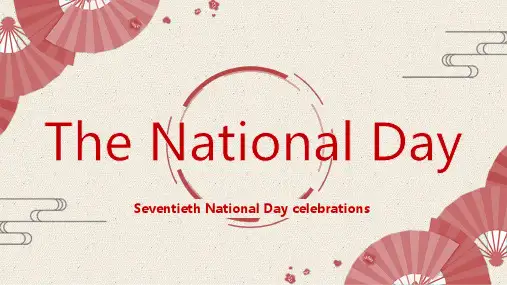
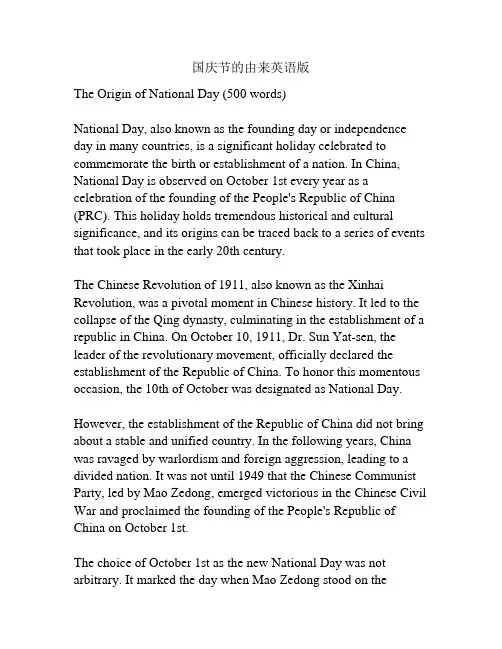
国庆节的由来英语版The Origin of National Day (500 words)National Day, also known as the founding day or independence day in many countries, is a significant holiday celebrated to commemorate the birth or establishment of a nation. In China, National Day is observed on October 1st every year as a celebration of the founding of the People's Republic of China (PRC). This holiday holds tremendous historical and cultural significance, and its origins can be traced back to a series of events that took place in the early 20th century.The Chinese Revolution of 1911, also known as the Xinhai Revolution, was a pivotal moment in Chinese history. It led to the collapse of the Qing dynasty, culminating in the establishment of a republic in China. On October 10, 1911, Dr. Sun Yat-sen, the leader of the revolutionary movement, officially declared the establishment of the Republic of China. To honor this momentous occasion, the 10th of October was designated as National Day.However, the establishment of the Republic of China did not bring about a stable and unified country. In the following years, China was ravaged by warlordism and foreign aggression, leading to a divided nation. It was not until 1949 that the Chinese Communist Party, led by Mao Zedong, emerged victorious in the Chinese Civil War and proclaimed the founding of the People's Republic of China on October 1st.The choice of October 1st as the new National Day was not arbitrary. It marked the day when Mao Zedong stood on theTiananmen Square in Beijing and proclaimed the birth of the PRC. This proclamation marked a significant turning point in Chinese history as it signaled the end of the era of foreign invasion and feudal rule.From then on, October 1st became a day of great importance to the Chinese people, symbolizing national unity, independence, and the progress of the nation. National Day became an occasion to celebrate the achievements of the Chinese people and showcase the country's cultural heritage and technological advancements. Spectacular parades, elaborate fireworks displays, and various cultural performances are held throughout the country during this holiday.Over the years, National Day has evolved into a time of national rejuvenation and patriotism. It is an opportunity for the Chinese people to reflect on the nation's past struggles and accomplishments, and to renew their commitment to building a prosperous and harmonious future. Many Chinese take advantage of the week-long holiday to travel and explore the country, reinforcing a sense of national unity and pride.In conclusion, National Day in China has its roots in the Xinhai Revolution and the establishment of the People's Republic of China. It serves as a reminder of the nation's tumultuous past and a celebration of its hard-won independence and unity. This holiday holds immense cultural significance and continues to be cherished by the Chinese people as a time to display their patriotism and honor their country's achievements.。
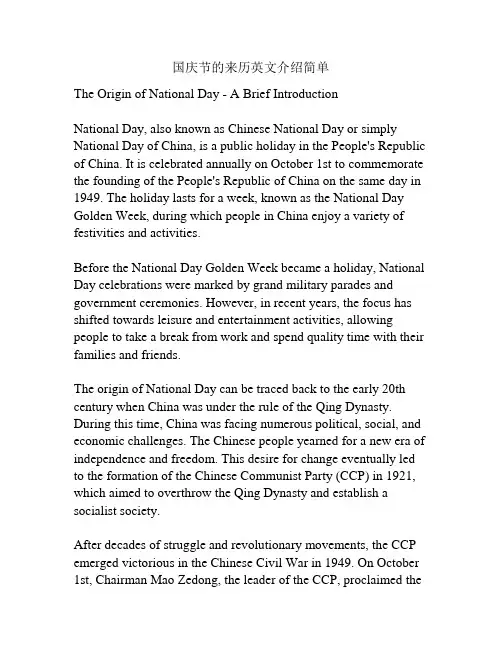
国庆节的来历英文介绍简单The Origin of National Day - A Brief IntroductionNational Day, also known as Chinese National Day or simply National Day of China, is a public holiday in the People's Republic of China. It is celebrated annually on October 1st to commemorate the founding of the People's Republic of China on the same day in 1949. The holiday lasts for a week, known as the National Day Golden Week, during which people in China enjoy a variety of festivities and activities.Before the National Day Golden Week became a holiday, National Day celebrations were marked by grand military parades and government ceremonies. However, in recent years, the focus has shifted towards leisure and entertainment activities, allowing people to take a break from work and spend quality time with their families and friends.The origin of National Day can be traced back to the early 20th century when China was under the rule of the Qing Dynasty. During this time, China was facing numerous political, social, and economic challenges. The Chinese people yearned for a new era of independence and freedom. This desire for change eventually led to the formation of the Chinese Communist Party (CCP) in 1921, which aimed to overthrow the Qing Dynasty and establish a socialist society.After decades of struggle and revolutionary movements, the CCP emerged victorious in the Chinese Civil War in 1949. On October 1st, Chairman Mao Zedong, the leader of the CCP, proclaimed theestablishment of the People's Republic of China, signifying the end of a long and arduous journey for the Chinese people.National Day was first formally celebrated in 1950, exactly one year after the founding of the People's Republic of China. The celebration was initially focused on political messages and military displays, demonstrating the strength and unity of the new Chinese government. Over the years, the celebrations have evolved to include various cultural performances, fireworks displays, and traditional activities.The National Day Golden Week was introduced in 1999 to boost domestic tourism and stimulate the economy. It is one of the busiest travel periods in China, with millions of people taking advantage of the long holiday to visit family, explore different parts of the country or engage in recreational activities.During the National Day Golden Week, cities across China are adorned with festive decorations, including national flags, red lanterns, and posters celebrating the achievements of the People's Republic of China. The main highlight of the week is the flag-raising ceremony held in Tiananmen Square in Beijing, where thousands of people gather to witness the event and show their patriotism.In addition to the flag-raising ceremony, numerous cultural events and performances are organized throughout the country. These include traditional music and dance shows, acrobatic performances, art exhibitions, and historical reenactments. Firework displays are also common, illuminating the night sky in a vibrant array ofcolors.The National Day Golden Week provides an opportunity for Chinese people to reflect on the progress their country has made and to celebrate their national identity. It serves as a reminder of the sacrifices made by the previous generations and the efforts required to build a prosperous and harmonious society.In conclusion, National Day is a significant holiday in China, marking the founding of the People's Republic of China and celebrating the achievements of the country. It is a time for people to come together, appreciate their national heritage, and enjoy the festive atmosphere.。
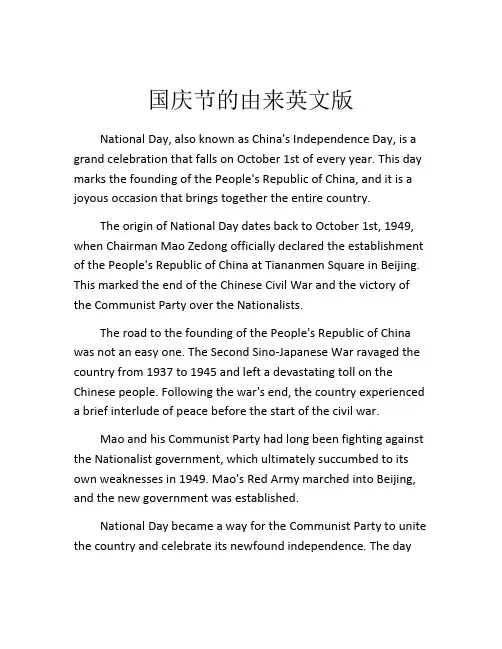
国庆节的由来英文版National Day, also known as China's Independence Day, is a grand celebration that falls on October 1st of every year. This day marks the founding of the People's Republic of China, and it is a joyous occasion that brings together the entire country.The origin of National Day dates back to October 1st, 1949, when Chairman Mao Zedong officially declared the establishment of the People's Republic of China at Tiananmen Square in Beijing. This marked the end of the Chinese Civil War and the victory of the Communist Party over the Nationalists.The road to the founding of the People's Republic of China was not an easy one. The Second Sino-Japanese War ravaged the country from 1937 to 1945 and left a devastating toll on the Chinese people. Following the war's end, the country experienced a brief interlude of peace before the start of the civil war.Mao and his Communist Party had long been fighting against the Nationalist government, which ultimately succumbed to its own weaknesses in 1949. Mao's Red Army marched into Beijing, and the new government was established.National Day became a way for the Communist Party to unite the country and celebrate its newfound independence. The daywas first celebrated in 1950, and it has been a staple of Chinese culture ever since.Every year on National Day, people from all over China gather to watch the grand military parade in Tiananmen Square. This parade showcases the nation's military might and technological prowess as the Chinese celebrate their hard-won freedom.National Day is a time to celebrate the progress the country has made, as well as to reflect on its history. It is a time to honor the sacrifices of those who fought to bring about the People's Republic of China and to celebrate the future of the country.Despite the challenges that China has faced over the years, National Day is a testament to the country's resilience and its ability to overcome adversity. It is a day to celebrate the greatness of China, both past and present, and to look to the future with hope and optimism.In conclusion, National Day is an important part of Chinese culture and history. It is a day to celebrate the country's independence, as well as to reflect on its past and look to its future. The struggles and triumphs that led to the founding of the People's Republic of China will always be a significant part of the country's identity, and National Day is a way to honor and remember them.。
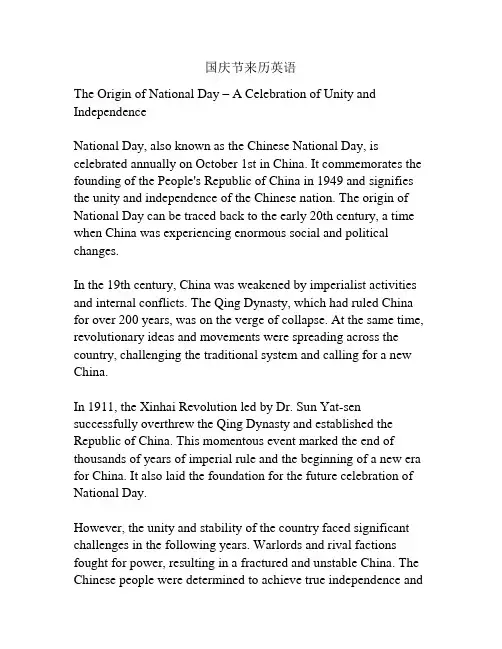
国庆节来历英语The Origin of National Day – A Celebration of Unity and IndependenceNational Day, also known as the Chinese National Day, is celebrated annually on October 1st in China. It commemorates the founding of the People's Republic of China in 1949 and signifies the unity and independence of the Chinese nation. The origin of National Day can be traced back to the early 20th century, a time when China was experiencing enormous social and political changes.In the 19th century, China was weakened by imperialist activities and internal conflicts. The Qing Dynasty, which had ruled China for over 200 years, was on the verge of collapse. At the same time, revolutionary ideas and movements were spreading across the country, challenging the traditional system and calling for a new China.In 1911, the Xinhai Revolution led by Dr. Sun Yat-sen successfully overthrew the Qing Dynasty and established the Republic of China. This momentous event marked the end of thousands of years of imperial rule and the beginning of a new era for China. It also laid the foundation for the future celebration of National Day.However, the unity and stability of the country faced significant challenges in the following years. Warlords and rival factions fought for power, resulting in a fractured and unstable China. The Chinese people were determined to achieve true independence andnational unity.It was not until October 1st, 1949, that the dream of a united China became a reality. On this day, Chairman Mao Zedong proclaimed the establishment of the People's Republic of China in Tiananmen Square, Beijing. China, under the leadership of the Communist Party, vowed to protect its sovereignty, independence, and territorial integrity.The following years witnessed significant achievements and advancements in various aspects of Chinese society. Economic reforms were implemented, leading to rapid industrialization and modernization. China also became a major player in international affairs, strengthening its diplomatic ties and seeking peaceful coexistence with other nations.National Day has since become a grand celebration for the Chinese people. It is a time when the nation reflects upon its history, pays tribute to its forefathers, and celebrates the achievements of the Chinese people. It is a symbol of national pride and unity.Today, National Day is marked by various ceremonies and activities. One of the most significant events is the flag-raising ceremony in Tiananmen Square, attended by top government officials and the public. Parades, fireworks, cultural performances, and exhibitions are held across the country as a way to showcase China's rich history, culture, and achievements.National Day brings together people from all walks of life, regardless of their ethnic or social backgrounds, to celebrate theunity and strength of the Chinese nation. It reminds us of the struggles and sacrifices made by our ancestors in building a better future for generations to come.In conclusion, National Day is more than just a public holiday; it is a testament to the resilience and determination of the Chinese people. It serves as a reminder of our past, an appreciation for the present, and a hopeful vision for the future. National Day is a time to come together, express our national pride, and reaffirm our commitment to a united and prosperous China.。
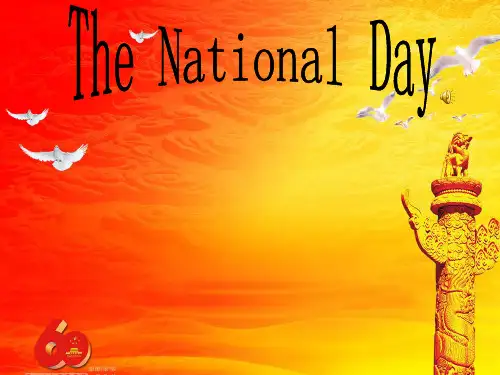

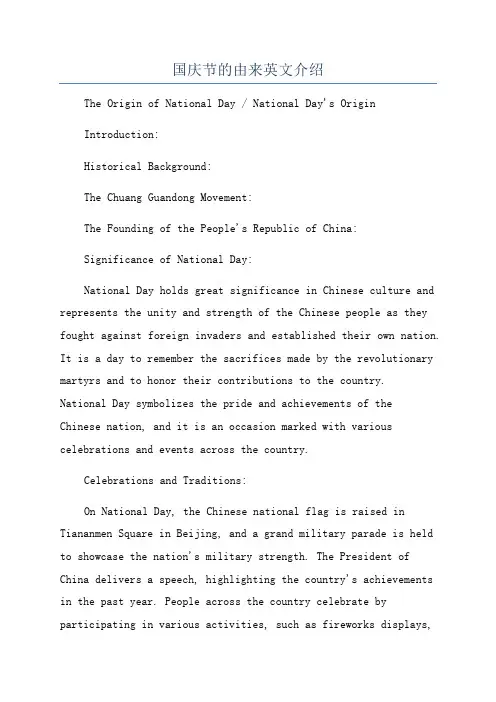
国庆节的由来英文介绍The Origin of National Day / National Day's OriginIntroduction:Historical Background:The Chuang Guandong Movement:The Founding of the People's Republic of China:Significance of National Day:National Day holds great significance in Chinese culture and represents the unity and strength of the Chinese people as they fought against foreign invaders and established their own nation. It is a day to remember the sacrifices made by the revolutionary martyrs and to honor their contributions to the country.National Day symbolizes the pride and achievements of theChinese nation, and it is an occasion marked with various celebrations and events across the country.Celebrations and Traditions:On National Day, the Chinese national flag is raised in Tiananmen Square in Beijing, and a grand military parade is held to showcase the nation's military strength. The President of China delivers a speech, highlighting the country's achievements in the past year. People across the country celebrate by participating in various activities, such as fireworks displays,parades, cultural performances, and art exhibitions. Citystreets and buildings are decorated with flowers, flags, and banners with patriotic slogans. Schools organize special programs, and families gather for meals and outings to celebrate the holiday.Conclusion:。
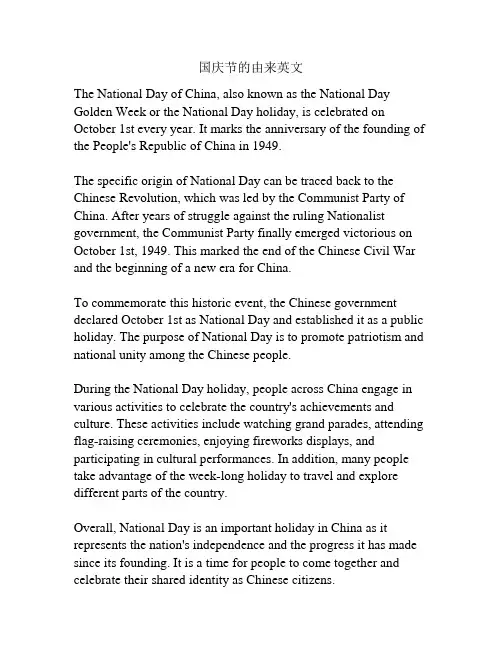
国庆节的由来英文The National Day of China, also known as the National Day Golden Week or the National Day holiday, is celebrated on October 1st every year. It marks the anniversary of the founding of the People's Republic of China in 1949.The specific origin of National Day can be traced back to the Chinese Revolution, which was led by the Communist Party of China. After years of struggle against the ruling Nationalist government, the Communist Party finally emerged victorious on October 1st, 1949. This marked the end of the Chinese Civil War and the beginning of a new era for China.To commemorate this historic event, the Chinese government declared October 1st as National Day and established it as a public holiday. The purpose of National Day is to promote patriotism and national unity among the Chinese people.During the National Day holiday, people across China engage in various activities to celebrate the country's achievements and culture. These activities include watching grand parades, attending flag-raising ceremonies, enjoying fireworks displays, and participating in cultural performances. In addition, many people take advantage of the week-long holiday to travel and explore different parts of the country.Overall, National Day is an important holiday in China as it represents the nation's independence and the progress it has made since its founding. It is a time for people to come together and celebrate their shared identity as Chinese citizens.。

中国传统节日国庆节:庆祝与传承**Title: Chinese Traditional Festival - National Day: Celebration and Heritage****Slide 1: Cover Page*** Title: Chinese Traditional Festival - National Day * Subtitle: Celebration and Heritage * Background: Flag of China waving with festive fireworks in the night sky.**English Content:**Welcome to our presentation on the Chinese Traditional Festival - National Day. This slideshow explores the significance, history, and celebrations associated with this important national holiday.**Chinese Content:**欢迎来到我们关于中国传统节日——国庆节的演示文稿。
本次幻灯片将探讨这个重要国家节日的意义、历史和庆祝活动。
**Slide 2: Introduction*** Title: Introduction to National Day * Content: Brief overview of National Day, its significance, and place in Chinese culture.**English Content:**National Day, also known as Guoqing Jie in Chinese, is a national holiday celebrated in China to commemorate the founding of the People's Republic of China (PRC) in 1949. It is a day of pride and unity, marked by parades, flag-raising ceremonies, and various cultural performances.**Chinese Content:**国庆节,又称“国庆节”,是中国为纪念1949年中华人民共和国成立而设立的国家节日。
国庆节的来历和意义英文版The Origin and Significance of National Day in ChinaNational Day, also known as the National Day of the People's Republic of China, is celebrated on October 1st each year. It marks the anniversary of the establishment of the People's Republic of China in 1949.The origin of National Day can be traced back to the Chinese revolution led by the Communist Party. After years of struggle, the Communist Party of China finally won the war against the Kuomintang government and declared the establishment of the People's Republic of China on October 1st, 1949. This day is remembered as a momentous occasion in Chinese history and symbolizes the triumph of the Chinese people's revolution.National Day holds great significance for the Chinese people. It is a time when the whole nation comes together to celebrate the achievements and progress of the country. On this day, various events and activities take place throughout the country, including flag-raising ceremonies, military parades, cultural performances, and fireworks displays.It is also a time for the Chinese people to reflect on their history and heritage. National Day serves as a reminder of the hardships and sacrifices made by previous generations to achieve national unity and independence. It is a time to honor and remember the contributions of those who have fought for the country's development and progress.In addition to its historical and cultural significance, National Day is also an important holiday for the Chinese people. It is a time for family reunions, as people often take this opportunity to travel back to their hometowns and spend time with their loved ones. Many people also take advantage of the week-long public holiday to go on vacations or participate in various recreational activities.Overall, National Day is a day of celebration, unity, and patriotism for the Chinese people. It is a time to cherish the achievements of the past and look forward to a bright and prosperous future for the nation.。
关于国庆节由来英语The National Day, also known as the National Day of the People's Republic of China, is celebrated on October 1st every year. It commemorates the founding of the People's Republic of China on October 1st, 1949.The National Day celebrates the victory of the Chinese Communist Party over the Kuomintang in the Chinese Civil War. After years of struggle, the Communist Party established the People's Republic of China, marking the end of over a century of foreign occupation and internal conflicts.On October 1st, 1949, Chairman Mao Zedong officially declared the establishment of the People's Republic of China in Tiananmen Square in Beijing. This marked the beginning of a new era for China and its people.Since then, the National Day has been an important holiday in China. It is celebrated with various activities and events, including military parades, fireworks displays, cultural performances, and public ceremonies. The day is also a public holiday, so people have the day off to relax and enjoy the festivities.The National Day not only signifies the birth of the People's Republic of China but also serves as a reminder of the country's achievements and progress. It is a time for the Chinese people to come together and celebrate their unity, patriotism, and national pride.。